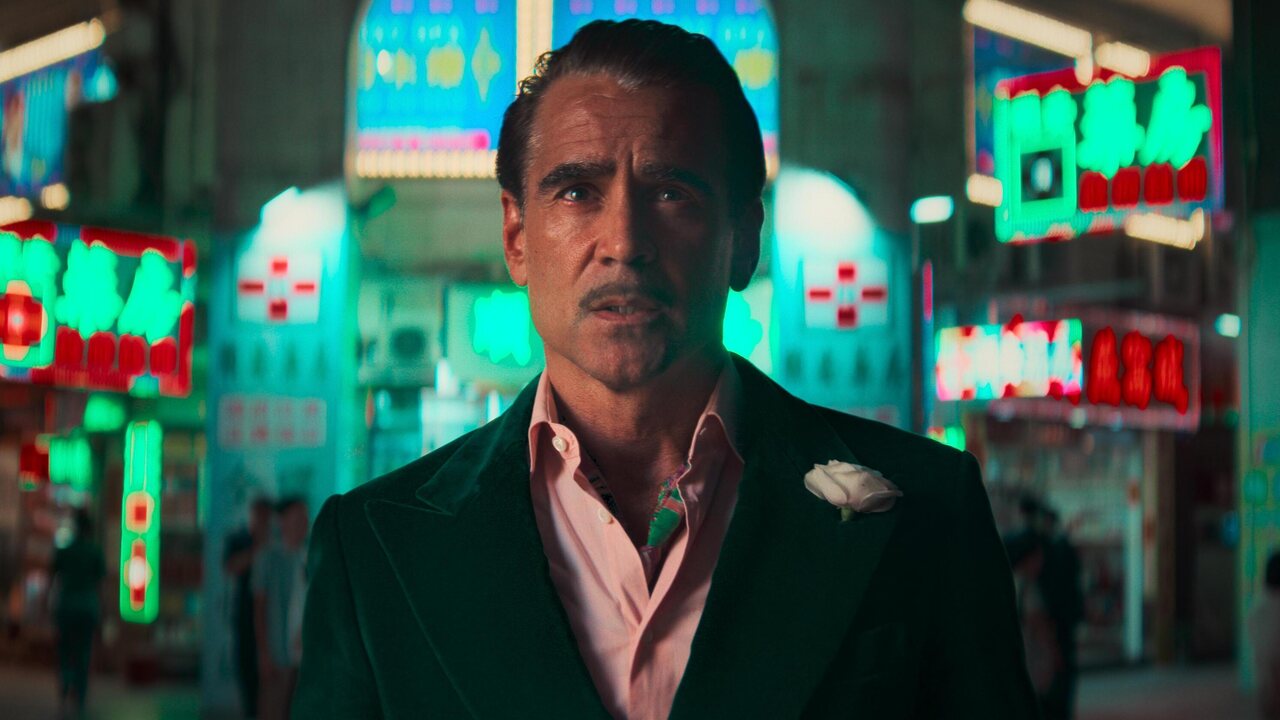
After navigating the bloody, grimy world of All Quiet on the Western Front and deriving suspense from the creamy blandness of Conclave, Edward Berger might have thought it was time to go on a holiday. But if All Quiet and Conclave have taught us anything, it's that Berger cannot rest without making grand points, and so he chooses a purgatory-like setting for his vacation. In Ballad of a Small Player, Berger goes crazy with kooky angles and dreamlike situations. He offers us tight close-ups of Lord Doyle (played by Colin Farrell) as he chews his food like a sweaty, gluttonous monster. Doyle is in deep debt, and his lucky gloves have given him no luck at the game of Baccarat. Doyle loses again and again and again, yet he cannot prevent himself from going to the casino again and again and again. At one of the casinos, he meets Dao Ming (Fala Chen), and the seeds of romance are planted. Berger, though, rushes through this development. He isn't interested in giving voice to the feelings Doyle has for Dao or vice versa. What he provides is a crash course in romance. The Google dictionary defines ballad as "a slow sentimental or romantic song." Sentimentality is what Berger goes for — he leans on it hard and hopes it covers up the thinness with which he imagines his story, his characters, his world.
How Doyle got greedy, and what he was like before he became a liar, a thief, a fraud, are things Berger and writer Rowan Joffé don't focus on. By reducing Doyle to an example—a puppet bound to the strings of the plot—the filmmakers reveal that their concern lies with shiny, cinematic tricks that create only an illusion of narrative boldness. A character mentions something about "Hungry Ghosts," and Doyle is told that a spirit was standing behind him when he won at the casino. What's more, Farrell's performance centers on contorting his face so grotesquely that little difference remains between his countenance and the ghost he perceives in reflective surfaces. The movie's message is literalized during such instances, and that message, alas, could be an email or a text: Gambling addiction is bad for your mental health. I would like to think that Berger wanted to go completely absurd, completely wild, but had to tether himself to the realm of logic so as not to lose the mass audience. Why else would anyone accept a lame decision like explaining some events through the "it was all in his head" twist? The dance during the end credits is actually the real highlight, but it ends before it can do anything to you physically, mentally, or sensually. This brings me to another message that emerges from the screen, which, I can only hope, the filmmakers had managed to comprehend after the shooting: Addiction to mediocrity is as dangerous as addiction to gambling. Let's hope Joffé and Berger do better next time.
Final Score- [4.5/10]
Reviewed by - Vikas Yadav
Follow @vikasonorous on Twitter
Publisher at Midgard Times
Get all latest content delivered to your email a few times a month.
Bringing Pop Culture News from Every Realm, Get All the Latest Movie, TV News, Reviews & Trailers
Got Any questions? Drop an email to [email protected]